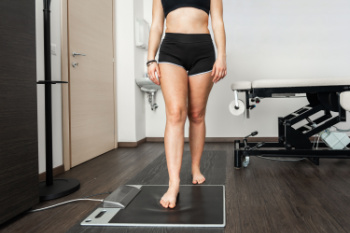 As people age, natural changes in foot biomechanics can significantly impact mobility and overall quality of life. The feet may lose padding and elasticity in the soft tissues, which can make walking uncomfortable due to the decreased cushioning. The arches of the feet may also flatten, a condition known as adult-acquired flatfoot. Flat feet can lead to changes in gait and increased strain on the ankles, knees, and hips. Additionally, conditions like arthritis may lead joints in the feet to stiffen and become less flexible, further limiting motion and causing pain during movement. These biomechanical changes can increase the risk of falls, reduce independence, and limit activities in older adults. Podiatrists play a key role in addressing these age-related changes by suggesting targeted treatment strategies. Included are prescribing orthotic devices to support weakened arches, recommending appropriate footwear to enhance stability and cushioning, and offering exercises to strengthen foot muscles and maintain joint flexibility. Regular check-ups with a podiatrist help manage these changes effectively, ensuring better mobility and reducing the risk of injury as one ages. If you are experiencing changes in your feet and mobility, it is suggested that you make an appointment with a podiatrist.
As people age, natural changes in foot biomechanics can significantly impact mobility and overall quality of life. The feet may lose padding and elasticity in the soft tissues, which can make walking uncomfortable due to the decreased cushioning. The arches of the feet may also flatten, a condition known as adult-acquired flatfoot. Flat feet can lead to changes in gait and increased strain on the ankles, knees, and hips. Additionally, conditions like arthritis may lead joints in the feet to stiffen and become less flexible, further limiting motion and causing pain during movement. These biomechanical changes can increase the risk of falls, reduce independence, and limit activities in older adults. Podiatrists play a key role in addressing these age-related changes by suggesting targeted treatment strategies. Included are prescribing orthotic devices to support weakened arches, recommending appropriate footwear to enhance stability and cushioning, and offering exercises to strengthen foot muscles and maintain joint flexibility. Regular check-ups with a podiatrist help manage these changes effectively, ensuring better mobility and reducing the risk of injury as one ages. If you are experiencing changes in your feet and mobility, it is suggested that you make an appointment with a podiatrist.
If you have any concerns about your feet, contact one of our podiatrists from Nola Sole Podiatry. Our doctors can provide the care you need to keep you pain-free and on your feet.
Biomechanics in Podiatry
Podiatric biomechanics is a particular sector of specialty podiatry with licensed practitioners who are trained to diagnose and treat conditions affecting the foot, ankle and lower leg. Biomechanics deals with the forces that act against the body, causing an interference with the biological structures. It focuses on the movement of the ankle, the foot and the forces that interact with them.
A History of Biomechanics
- Biomechanics dates back to the BC era in Egypt where evidence of professional foot care has been recorded.
- In 1974, biomechanics gained a higher profile from the studies of Merton Root, who claimed that by changing or controlling the forces between the ankle and the foot, corrections or conditions could be implemented to gain strength and coordination in the area.
Modern technological improvements are based on past theories and therapeutic processes that provide a better understanding of podiatric concepts for biomechanics. Computers can provide accurate information about the forces and patterns of the feet and lower legs.
Understanding biomechanics of the feet can help improve and eliminate pain, stopping further stress to the foot.
If you have any questions please feel free to contact our office located in New Orleans, LA . We offer the newest diagnostic and treatment technologies for all your foot and ankle needs.
